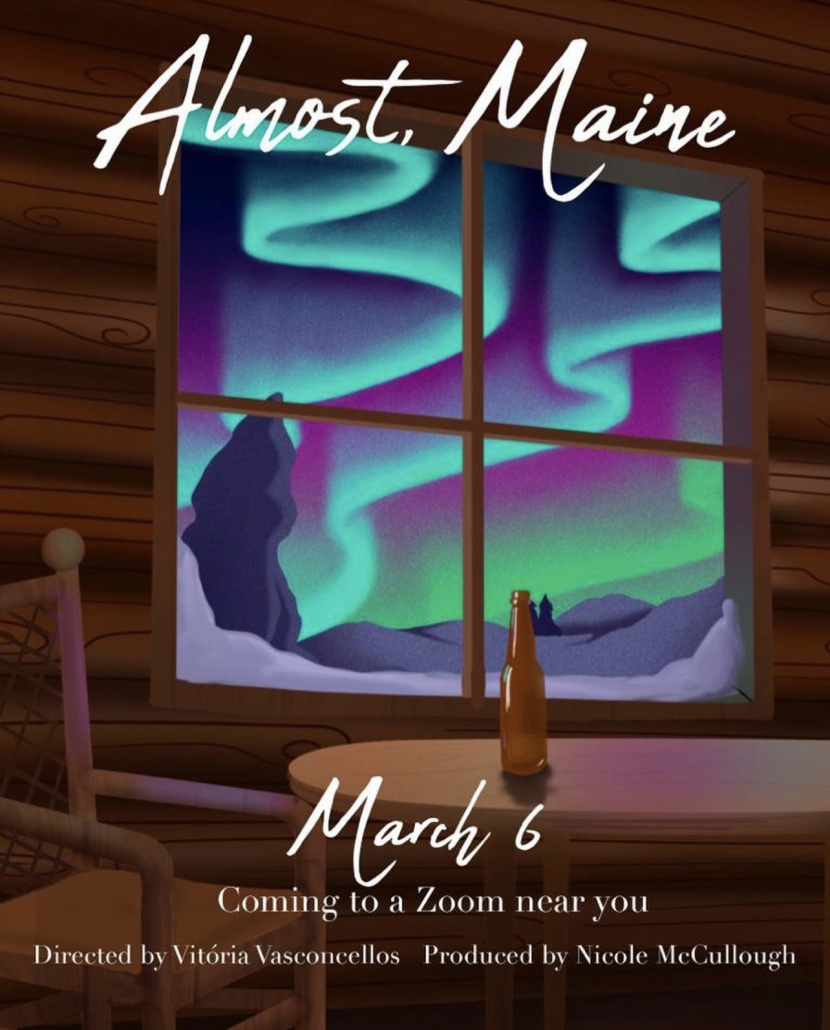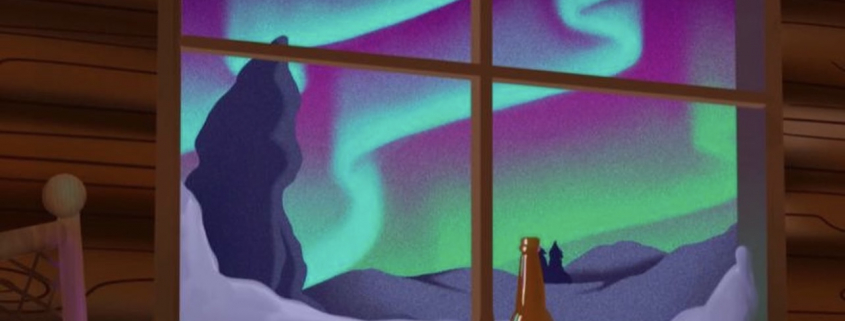SCA graduates bring classic play to life on Zoom

With the Zoom premiere of “Almost, Maine,” the theater community can rest assured that the era of live theater as we know it is far from over.
Those who dwell within the theater realm seem to constantly produce new material despite the infectious irritation of remaining isolated from one another. But for “Almost, Maine” director Vitória Vasconcellos and producer Nicole McCullough, who are both USC alumnae, the timelessness of the piece is perfectly suited for this current era of seclusion.
Like most of the community, Vasconcellos and McCullough fell into the rabbit hole of theater through discovering their love for acting and film.
Vasconcellos has always considered herself an actor before anything else, but also discovered a love for writing short films when she became a film student. Vasconcellos found that she could perform more parts when writing the script herself and, eventually, explored her interest in directing.
“When I say that I’m a filmmaker, it means that film and acting have sort of merged [for me],” Vasconcellos said. “And ‘Almost, Maine’ is a bit of a hybrid of all of that.”
On the other hand, as early as high school, McCullough was torn between her love for acting as well as her love for sports. Eventually, she officially decided to quit the cross country and track teams to have extra time to commit to the school play. In her junior year of high school, McCullough discovered her love for producing by attempting to combine her interest in film and entertainment with her passion for creating a positive social impact, which ultimately became the reason she decided to apply to the School of Cinematic Arts at USC.
“It was kind of in that moment that I made the decision … [to] sacrifice something else I love so that I can do this,” McCullough said. “That was the first time that I had to make that choice.”
Inevitably, Vasconcellos and McCullough’s worlds collided when they met each other for the first time in Delta Kappa Alpha, the cinematic arts fraternity, as two students in SCA.
Having been friends since the second semester of their freshman year, Vasconcellos approached McCullough with the idea to put on “Almost, Maine” on Zoom. Luckily enough, because of the travel restrictions placed on people arriving from outside of the United States, Vasconcellos, stuck in Brazil, had two months in her schedule when she was completely free to direct the Zoom play.
“I reached out to Nicole in a spontaneous way,” Vasconcellos said. “We had a month and a week to do this … We’ll see what happens!”
“Almost, Maine” is a play by John Cariani that tells a series of loosely strung tales about love and connection, each with a compelling couple at its center. So with the concept having come to fruition, Vasconcellos and McCullough got to work right away.
Both contacted other actors and creators they knew in hopes of getting them involved with the production. The more people they added to the project, the more real it began to feel to Vasconcellos and McCullough.
“It was supposed to be a project between friends … and really low key,” Vasconcellos said. “But then we made an Instagram account so we could post the link somewhere [and] it just kept growing.”
Like with any typical theatrical performance, however, Vasconcellos and McCullough faced many challenges, especially over Zoom.
“None of us have done a Zoom play,” Vasconcellos said. “Because Zoom is such a work in progress, [there are] transitions between one thing and the other and sometimes the mood completely changes. How are we able to convey this in just a couple of seconds on Zoom?”
Fortunately, Vasconcellos and McCullough were able to bring in Emely Tario, a junior majoring in mathematics and comparative literature who had prior experience in working on the technical team for USC performances back when live theater was the norm, to oversee their technical Zoom ventures.
“I have seen all the workings of Zoom,” Tario said. “[And] the actors are doing a good job using and understanding this [Zoom] rectangle.”
To address all of their technical obstacles, Tario helped Vasconcellos and McCullough come up with creative solutions for adapting the piece to the virtual platform.
For instance, in “This Hurts,” Act 1 Scene 3 of the play, the character Marvalyn (portrayed by Alex Punch) hits Steve (portrayed by Ahash Francis) on the head with an ironing board. Using the platform to their advantage, the Zoom rectangles of Punch and Francis are seen alone and placed right next to each other, so the audience is able to see both the perspectives of Marvalyn and Steve at the same time. And through additional camerawork and raw acting, the audience still gets to see Steve be hit on the head.
“Nothing has changed,” Vasconcellos said. “The kissing, the hitting — all the interactions are still there because our actors are extremely hardworking and committed to exploring Zoom.”
Not only were the challenges technical in nature, location and time also played key factors in the obstacles Vasconcellos and McCullough faced in production. But with cast members from all over the globe — from places including Los Angeles, Brazil, Nevada, Mexico, Sri Lanka and Australia — McCullough knew that what they were doing was worth it.
“The meetings have been tough because our time zones are not very compatible,” McCullough said. “But we’re [all] passionate … and kind to each other.”
In the midst of all of their difficulties, Vasconcellos and McCullough said they were able to see the bright side of putting on the production in the first place.
“This ensemble has really proven to me that we can still convey the true feeling behind theatre,” Vasconcellos said. “The idea of seeing a scene and being transformed by it or letting it transform you still happens over Zoom.”
Setting itself apart from other Zoom productions, “Almost, Maine” will be done completely “live,” as per an executive decision between Vasconcellos and McCullough. All of the actors will be performing in real time, the way it would have been done on stage in-person, while the audience observes from within the meeting room.
“A huge part of the value of theater is the live element of it,” McCullough said. “I think from an audience perspective, you’re watching the story unfold while the actors are also experiencing it unfold. There’s something about … [the] riskiness that is a really fun part of theater. It’s challenging for us to produce, but it will be worth it.”
Putting on the show completely live when quarantine is over and theaters reopen, however, is a completely different story. With the huge emphasis on the theme of human connection throughout the play, Vasconcellos said the story would not be as timely as it would be during quarantine.
“It’s a play about the one thing we’ve been missing this past year, which is human connection,” Vasconcellos said. “Maybe when quarantine is over, the kind of art that people will need to see and experience will be something different.”
Thematic considerations aside, the practicality of switching from one medium to another also becomes a factor.
“I’ve gotten so accustomed to the adjustments [on Zoom],” Tario said. “If I try to put the production on live, I’d be starting from scratch.”
Moving forward, and as film students first, both Vasconcellos and McCullough see themselves working more within their fields in the future.
“[‘Almost, Maine’] really started like an exercise for me,” Vasconcellos said. “I didn’t think I could direct a play. But, I think I’m a better artist because of these people that I’ve worked with in this production.”
Although she sees Zoom productions as a hybrid between film and theater, McCullough claims that Zoom adaptations work until they don’t.
“This play is really unique because it’s an anthology … so this works for Zoom,” McCullough said. “I don’t think all stories would work out for Zoom. [But] I would totally be interested in doing more readings and more things that can capitalize on the benefits of Zoom down the line.”
Whatever the case, Vasconcellos and McCullough have brought to life one of the most relevant pieces of today’s stuck-at-home world. By doing so, people, like the “Almost, Maine” on Zoom team, continue to breathe life into the world of theatre during these uncertain times.
“A lot of ‘Almost, Maine’ is enhanced because of Zoom in a bizarre way,” Vasconcellos said. “I hope that everybody who watches it shares this … discovery … with me.”
“Almost, Maine” premieres live this Saturday, March 6 at noon PST. Zoom link for the performance can be found here.

